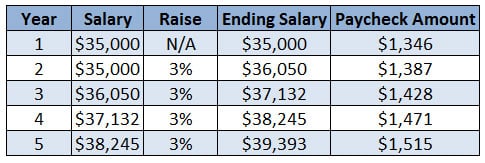THIS POST MAY CONTAIN AFFILIATE LINKS. PLEASE SEE MY DISCLOSURES. FOR MORE INFORMATION.

Did you know if you took some time to negotiate before accepting a job offer, you could get more than what you were offered initially and end up earning an additional $20,000 or more over the next 10 years? Yes, you heard that right! All you need to do is learn how to negotiate a job offer.
I know this might sound impossible to some of you, but it isn’t – companies actually expect you to negotiate your salary.
They purposely offer you a starting salary towards the low end of the range. By negotiating, you are simply starting off a little higher in the pay range for the job.
By not negotiating a job offer, you are leaving thousands of dollars on the table! Think of what you could do with the extra money. By simply getting a $2,500 raise (which isn’t out of the question), you could bring in close to $100 more per paycheck.
What would you do with an extra $100 every paycheck? You will stress less over money, can pay off debt, save for a nice vacation, and whatnot!
In this post, I’ll teach you some tips and tricks, so you learn how to negotiate a job offer. Let’s get started!
Table of Contents
The Importance of Negotiating a Job Offer
As I mentioned earlier, the main reason you want to negotiate your starting salary is for higher earnings down the road. Let’s look at an example to see just how this plays out in real life.
Let’s assume you are offered a starting salary of $35,000, and you accept the offer without making any negotiations
You earn a 3% raise each year for the next 5 years. After 5 years, your annual salary is $39,393, an increase of over $4,000. You went from earning $1,346 to $1,515 per paycheck, an increase of more than $150 per paycheck.
- Read now: Learn how much $15 an hour is annually
I’m sure anyone reading this would be happy with this scenario.

But let’s say you negotiate your job offer and earn a 5% increase in your starting salary. You start off making $36,750 and earn a 3% raise each year for the next 5 years. After 5 years, your annual salary is $41,362, an increase of $4,600.
You went from earning $1,413 to $1,591 per paycheck, an increase of over $175 per paycheck.

By taking just a few minutes to counter when you were offered your starting salary, you earned yourself an additional $9,290 over 5 years!
Taking this example out further and seeing how negotiating a job offer plays out over the course of 10 years, let’s take two cases: one where you accept the offer without negotiations and the other where you negotiate it.
Below are two charts, one with the $35,000 starting salary and the other with a negotiated $36,750 starting salary. In each case, you earn a 3% annual raise.

By negotiating your job offer, you make $20,000 more in total salary after 10 years! If you keep working this same job, you will continue to earn more money every single year until you quit, and if you decide to do so after 10 or even 5 years, you will start off earning more money in your new job.
If you’re earning a little more than $47,000, you can expect to start your new job making close to $50,000, and if you negotiate your starting salary, you will continue to earn more money every year thereafter.
Salary Negotiation Tactics
As great as the extra money sounds, the thought of negotiating your salary is scary. Nobody wants to risk losing their potential dream job by asking for more money.
But remember that all jobs have a salary range. When you are offered a job, odds are you are going to be in the lower end of this range. This means you can comfortably negotiate for a higher salary.
Of course, you have to be reasonable. You can’t ask for $25,000 more if you are offered a job with a $35,000 salary!
Here are some other critical salary negotiation tactics for you to follow to ensure you get the highest starting salary possible.
1. Let the Interviewer Make the First Offer
If you can get the interviewer offering you the job to provide a number first, this puts you at a great advantage.
For example, you came into the interview hoping to get $40,000, but by letting the interviewer make the first offer, you might be offered $42,000. Now you can negotiate based on $42,000, not $40,000. You are already $2,000 ahead!
Unfortunately, this doesn’t always work. Many interviewers are great at getting you to name your salary first. How do you overcome this? Simply tell them what you are making at your current job and follow that up by telling them you want to be paid fairly and then ask what the range is for the position.
Here is what you could say:
My current salary is $38,000 annually, and I am looking to be paid fairly based on my skills and experience. What is the salary range for this position?
This forces them to provide you with the salary range, which gives you more insight into how much higher you can counter when they do make you an offer.
2. Do Your Research for the Company and Position
If you can’t get the interviewer to offer the salary range of the position, you are going to have to do some digging.
Simply visit GlassDoor or Indeed to find out what current employees are being paid in your position at the company.
When using GlassDoor, the salary ranges are provided in the job listings themselves.
When using Indeed, just click on “Find Salaries” at the top of the page and type in a company name. From there, the site will list salaries for various positions.
<iframe width=”1350″ height=”480″ src=”https://www.youtube.com/embed/8MYHrih6syw” title=”How to Research Before an Interview (3 Practical Tools)” frameborder=”0″ allow=”accelerometer; autoplay; clipboard-write; encrypted-media; gyroscope; picture-in-picture; web-share” allowfullscreen></iframe>
3. Draft the Reasons Why You Deserve More Money
You are going to have to show why you deserve a higher starting salary when you write your salary negotiation letter.
So, take the time now to come up with the reasons why. Here are some things to think about.
- Do you have more education than the job requires? Are you in the process of getting an advanced degree?
- Do you bring additional skills to the job? How would these skills translate into making you more efficient at the position?
- Have you had great success in a similar position, and are you certain you can translate that level of success to the new job?
- If you are having trouble figuring out reasons why you stand out, consider completing a SWOT analysis.
4. Always Give a Salary Range
When you only offer a set salary, you box yourself in. Going back to the point above, if you say you want to make $40,000 annually and the company is willing to pay you $42,000, odds are you will start at $40,000.
By giving a salary range, you open the door to earning a higher pay rate.
5. Use an Odd Number
When it comes time to counter the salary offered, don’t use a round number, but make it an odd number.
For example, don’t counter with $37,000 but with $37,250. Having the smaller amount after the comma makes the person psychologically think that it is a smaller number, giving you a little extra salary without it looking like you are asking for a lot more.
6. Always Counteroffer
This is the whole point of this post. No matter how much salary they offer you, make sure to counteroffer. There are a few ways to do this, either in person or via a letter or email.
In the next section, I’ll walk you through the steps for creating a salary negotiation letter and counteroffer.
7. Never Counteroffer More Than Once
While it is critical that you counter when a salary offer is given to you, you can only do so once. If you continually drag out the negotiations, the hiring manager will lose interest in you and will most likely begin to look at other candidates to offer the job to.
Therefore, it is important that your counteroffer is completed correctly. Again, I’ll get into more detail about this in the next section.
8. Keep Your Emotions in Check
Don’t get caught up in the negotiations and think the hiring manager is the bad guy for not offering you more money. Remember, in the end, you want to be on the same team, working for the same company.
Try to put yourself in their shoes. Is the economy in a slump, and as a result, companies aren’t willing to pay higher wages? Maybe the skills that you think make you stand out aren’t looked upon as highly by the hiring manager.
By keeping your emotions in check and working through the negotiations strategically, you can get the higher salary and job you want, and the company can get the stellar employee they want.
9. Practice
The last of the salary negotiation tactics is to practice. Role-play with a loved one by having them be the hiring manager and give reasons why they won’t offer you a higher salary.
Work on formulating solid examples and reasons why you deserve a higher salary.
This will help you be ready when the hiring manager asks you questions. Being prepared with well-thought-out answers only increases the likelihood of getting a higher salary.
Also, role-playing teaches you not to be emotional when talking about money.
Sample Salary Negotiation Letter and Email
Now that you understand how much money you can gain from negotiating a job offer, you must be wondering how exactly it works. What is the process?
After an interview, you will receive a phone call, email, or letter in the mail with the job offer, job details, and proposed salary.
Once you have this, it is time to create your salary negotiation letter. You could draft an email as well. I usually respond in the same manner as the offer. So if I received an email, I would reply with an email.
The first thing you need to do when writing your salary negotiation email is to thank the hiring manager for the offer.
The next step is to talk about how excited you are about the position. You do this so that the hiring manager knows they aren’t wasting time negotiating with you. Of course, you can still decide to turn the job offer down, but you don’t want to lose it at this point.
After this, you want to state your case as to why you are countering on the proposed salary and give concrete reasons why you deserve a higher starting salary.
Finally, you want to end the letter by restating your interest in the job. Again, you want the hiring manager to be certain they aren’t wasting their time by negotiating with you, and if you can come to an agreement over salary, you will take the job.
Let’s look at this written out in a sample salary negotiation letter. Feel free to copy this letter and replace the parts to fit your situation. This also works as a sample salary negotiation email as well.
Dear ABC (HIRING MANAGER’s NAME),
I want to first thank you for offering me the position of JOB TITLE. I am very interested in working for your company.
I understand you have carefully considered how much you believe the job is worth. As we discussed in our interview, I believe I can do this job more effectively/ efficiently/ profitably/etc. by doing/offering ENLIST REASONS
Because of this, I believe my contribution to this job would be worth DESIRED SALARY AMOUNT.
Please let me know if you are open to discussing this in greater detail, either in person or over the phone.
I am eager and excited to begin working for COMPANY NAME, assuming we can work out the salary.
Thank You,
YOUR NAME
You can also use this as a salary negotiation counteroffer letter since you are countering what they originally offered you.
In terms of the amount to put into your salary negotiation letter, this is where all your research comes into play, along with what you feel you are worth.
For example, if you find the salary range for this position is between $40,000 and $50,000, and they offer you $40,000, you have to determine how much you are worth.
Remember, you only get one shot at this, and most times, the goal is to come to an agreement. Many times this means meeting in the middle.
So if they originally offered you $40,000 and you counter with $45,000, the agreed amount will most likely be $42,500. Therefore, it is important that you counter with a higher number than you expect to get, but within reason.
You can’t just counter with $60,000 in hopes of getting a $50,000 starting salary. First, $60,000 is out of the salary range for the job. Second, you have to be reasonable and consider what you bring to the table.
So take your time and think about what is a reasonable salary that you should be paid and add 10% to it. Then counter with this amount.
Additional Points to Negotiating Your job Offer
Ideally, once you make your counteroffer, you will come to an agreement by meeting in the middle. But what if the company isn’t open to negotiating salary? Are you just left with accepting the job offer as is? Not exactly.
You can always negotiate your job perks too. You could ask for a larger bonus, more days off, a flexible work schedule, etc. The catch here is you need to be upfront with many of these things in your interviews.
For instance, during the interview, it may come up that you have young children. If the hiring manager won’t budge on the salary, remind them of your young children and ask if they would be open to a flexible work schedule instead.
Here is how something like this played out in my last job. I was making roughly $40,000, and the new job offered me the same starting salary. I pointed out what I brought to the table and why I deserved more and countered with $47,000 with the hopes of getting close to $45,000.
But the company came back and only offered me $42,500. While this salary negotiation was a success in that I negotiated for a higher salary, I still felt my skills were worth more. The catch was that I was excited about this opportunity.
So I followed up and told them again how excited I was for the opportunity. Then I countered in another way. I had 2 more classes left to complete my graduate degree, and my current employer was paying part of the bill.
I asked the hiring manager if they would be willing to pay for my remaining classes in full. I then reminded them what I would bring to the table with this additional education and told them that if they agreed, I would be happy to accept their offer of $42,500.
I received a phone call later that afternoon that they agreed, and I received the updated job offer details the next morning.
While I didn’t get the starting salary I desired, I did earn a higher salary by negotiating, and I got the company to pay the $8,000 for my remaining graduate courses.
Another option is to simply agree to the salary they offer but ask for a performance review in 6 months. At that time, you can sit down with your manager and review your job performance, and if you meet or exceed certain benchmarks, you will get a pay raise.
If you o go this route, just be certain everything is in writing.
The moral is not to accept the offer if the company says no to a salary negotiation. Be ready to counter with another option. Just make sure what you are countering with makes sense and that you have valid reasons to back it up.
Final Thoughts
There you have it – the process of learning how to negotiate a job offer! As you can see, it is important that you make an effort to get a higher starting salary. Not only will you be making more money that year, but each year you will earn a raise, which will be larger – thanks to compounding.
Use the salary negotiation tactics laid out here to negotiate the right way, and then use the sample salary negotiation letter to make sure you get the starting salary you want.
I know it can be intimidating to ask for more money, but you are worth it. Don’t make the mistake of leaving money on the table, thinking it won’t make a difference. It is enough money to change your finances for the better, starting with your first paycheck.
If you have any questions or concerns, reach out at contact@moneysmartguides.com. Alternatively, you can find MoneySmartGuides on Facebook, Twitter, and Pinterest.
I have over 15 years experience in the financial services industry and 20 years investing in the stock market. I have both my undergrad and graduate degrees in Finance, and am FINRA Series 65 licensed and have a Certificate in Financial Planning.
Visit my About Me page to learn more about me and why I am your trusted personal finance expert.


Many people do not consider negotiating a job offer. Many even do not know that they can negotiate their salary at the very beginning. You have come up with a very nice topic. This will help people to start their career with a little higher pay range.